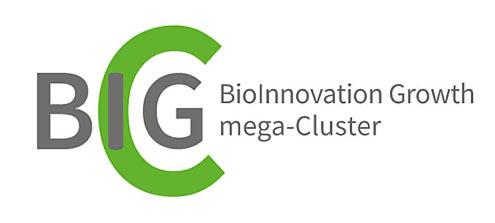Industrial Biotech
The use of biotechnological methods in industrial production processes is often labeled as industrial or “white” biotechnology. Here, microorganisms and biochemical methods are used within technological applications in a targeted manner to effectuate an intermediate step or even synthesize the final product. Accordingly, biotechnology is often used as “cross-sectional technology” – well-known areas of application are, among others, the pharmaceutical, chemical, steel, cosmetic, food, and fodder industries. Industrial biotechnology provides processes that are clearly more energy-efficient and environmentally friendly than classic process engineering. This results in products that are not just the equals of established products, but actually surpass their functionalities.
Great methodological advances have been realized over the last years, such as bioconversion through biocatalysts (enzymes), process-optimization targeted evolution, or the identification of new enzymes using metagenome analysis.
Biotechnological processes have the potential to increase productivity and product diversification. Industrial biotechnology is therefore seen as a key technology regarding value creation, innovation, and generating economic growth. It thereby enables the transformation of existing markets. Industrial biotechnology is thus also a key technology for the transition to a bio-based economy and can contribute to meeting environmental and climate challenges.
To further promote the dynamic development of industrial biotechnology, BIO.NRW works together with its partner cluster CLIB – Cluster industrielle Biotechnologie e.V. CLIB is an international open innovation cluster of large companies, SMEs, academic institutions and universities and other players active in biotechnology and bioeconomy. The cluster has more than 100 members, of which about 25% are international members. The overall objective of CLIB is to network actors along and across value chains and to identify new opportunities for innovation, projects and business ideas. In this way, the cluster realizes its mission: to develop cross-sectoral biotechnological solutions for more sustainable processes and products. CLIB is an association whose members shape the interests and activities of the cluster. An overview of selected, currently running projects can be found here.
CIRCULAR-BIO Interreg Network
Supported by: INTERREG Deutschland-Nederland
Project duration & Grant amount: October 2019 – September 2022, 992.000 Euro
Project partners: CLIB (Koordinator); Arvalis, Brightlands Campus Greenport Venlo, EE Energy Engineers, Gemeente Venray, Hochschule Niederrhein, Stadt Krefeld, USV Agrar Dr. Arno Becker, WFG Krefeld
Link: www.circular-bio.com
Topics such as sustainability, or the use of environmentally friendly and recyclable products playing an increasingly important role in our society. But how do we respond to the growing demand for biomass components from different markets to meet these requirements? CIRCULAR-BIO aims to provide answers by bridging the gap between practitioners from agriculture, processing, chemicals, logistics, waste management, as well as municipalities and economic development agencies. The aim is to find ways of optimally linking organic raw materials, logistics and value chains across borders. The aim is to create new business models and value networks in the region in order to pave the way towards a circular bioeconomy.
BioInnovation Growth mega-Cluster - BIG-Cluster

Project duration: unlimited
Project partner: BE-Basic, Biobased Delta, BIO.NRW, Catalisti, CEF.NRW, Chemelot Brightlands, CleanTechNRW, CLIB2021, FlandersBio & Flanders Biobased Valley
Link: BIO.NRW or CLIB or BIG-Cluster.
The BIG-Cluster initiative is a joint undertaking of 10 clusters and networks in North Rhine-Westphalia, the Netherlands and Flanders in Belgium started in 2013. The trilateral region is Europe’s largest chemical cluster and BIG-Cluster aims at promoting and supporting the transformation of the region into the globally leading region in bio-based and circular economy. Therefore, BIG-Cluster networks stakeholders, promotes consortia forming and improves framework conditions for the bio-based economy.
BIG-Cluster has defined important topics to focus on. These are the flagship topics “aromatics and fine chemicals from woody biomass”, “chemicals from CO and CO2”, and “alternative fuels from various feedstocks” and the cross-cutting topics “bioeconomy education”, “closing the loop”, and digitalization”.
HiPerIn 2.0: Shaping the Next Generation of Bio-based High Performance Ingredients - Realization Phase
Supported by: Ministery of Economy, Innovation, Digitization and Energy of North-Rhine Westphalia
Project duration & Grant amount: January 2020 – December 2022, 666.000 Euro
Link: www.clib-cluster.com
A key strength of biotechnology is the conversion of functional, biobased feedstocks into high-value products in areas such as specialty chemicals, cosmetics, the food industry and the pharmaceutical industry. These “high-performance ingredients” (HiPerIn) are characterized by a high market value at comparatively low production volumes and can thus act as pioneers for new technologies, new processes and ultimately a bioeconomy in itself. For selected “high-value” market segments, CLIB will incorporate the cross-cutting themes of digitalization, circular economy, end-of-life, regulation, and public perception, which are transformative for the sector in various ways. HiPerIn 2.0 aims to initiate innovative project consortia, to involve new actors at sector interfaces and in cross-cutting issues, and to improve the flow of information between actors in science, industry and society.